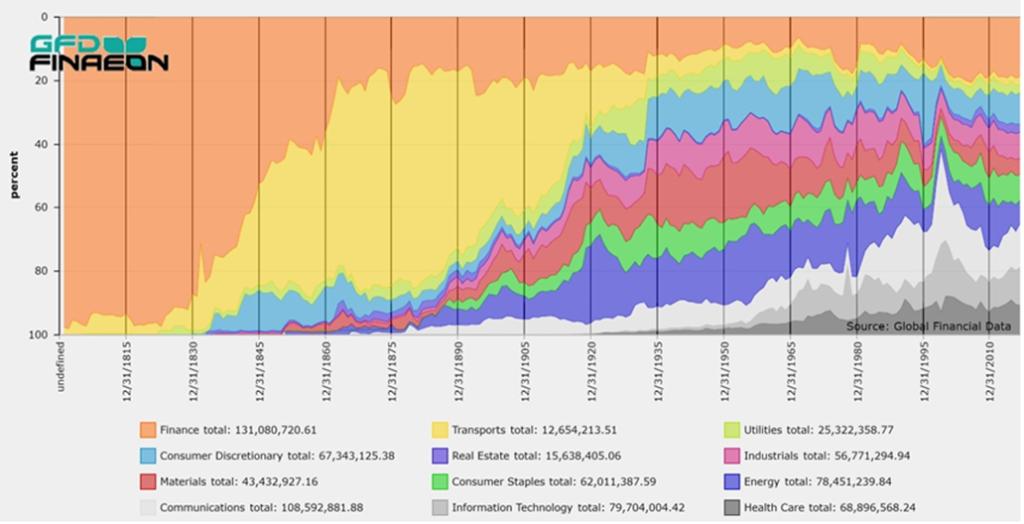Car manufacturers will not only sell cars

Are we sure that the car manufacturers of the future will simply sell cars? Most likely not. Here because. Raffaele Perfetto's analysis
(Extract of an article published on Econopoly – Sole 24 Ore, here the full version)
Industrial revolutions are phenomena that have a disruptive character: in which some technologies quickly impose themselves on others because they do better than the previous ones or in a more economical way or because they respond to needs that did not exist before.
Are we sure that the car manufacturers of the future will simply sell cars? Most likely not.
Before taking a leap into a "possible" future, let's look at this graph. It shows the evolution of the 12 GFD (Global Financial Data) sectors and, while referring to the American economy, it gives us an idea of the last 200 years. Different waves can be identified. At the beginning (in the nineteenth century) it was finance, determining the capital necessary for subsequent waves such as transport and trade. The latest wave, which reflects the current situation, owes a lot to the transistors and semiconductors that enabled the transmission, calculation and storage of information.

In the book “The Fourth Revolution – how the infosphere is changing the world”, Luciano Floridi, professor at Oxford, makes us reflect on a possible future. We have entered the Hyperstoria: the volume of data and information to which we have access is growing exponentially. A new reality emerges: onlife. A neologism coined by Floridi himself to underline the constant hybridization between online and offline. Today it is no longer possible to distinguish when we are online and offline, we are constantly here and there, online and offline: onlife.
What does the car have to do with it? She too is a "victim" of this wave. Perhaps we will no longer call it auto but mobility, it is not yet clear what it will be, but something will emerge from the sorcerer's cauldron.
For Intel, there is no doubt: cars are the third fastest growing technological device in terms of connections after phones and tablets. The new cars will be connected to the internet and will start finding parking and parking, signaling the presence of other vehicles or for example the cheapest gasoline prices and so on. “Mechanics are becoming computer engineers” Floridi points out in his book published in 2017. In the 2019 annual report of the German company Volkswagen we read the following:

Here, however, other interesting info, taken from the report of a consulting company published in 2019, on the growing weight of semiconductors and electronics for the car.
CONCLUSIONS
In a world where the economy is growing slowly, we could imagine a future in which Floridi's onlife represents the basis for new growth. The car of the future will move on the road infrastructure but it will also need 5G: the highway on which the data will move will lead the car into the new hyper-historic dimension.

Meanwhile, Reuters in a November article, citing IHS Markit data from AutoScout24 , reported that there has been a marked rise in registrations of old cars across Europe, as well as a spike in Internet searches for obsolete vehicles. The reason is pretty obvious if you look at the following graphs from a Financial Times article. The demand for public transport is reduced (due to Covid ), consequently the private one increases.

There is a problem: the severe economic crisis causes a pandemic. Before Christmas we were impressed by the images of Milan (below left), the financial capital of Italy, with the very long lines of the "new poor" looking for a hot meal. The crisis will pass, sooner or later. And if it is true that the new generations are the most sensitive to climate issues and therefore may be willing to pay more for a greener car, it is also true that compared to previous generations they are poorer (or "otherwise rich"). . This graph (below, right side) recovered from an article in the Washinghton Post gives us the idea: at the same age, the last three generations see their contribution to national wealth decrease.

On the one hand a world to strive for, on the other a reality weighed down by the economic-pandemic crisis. From this tension will be born the car and its market of the future.
In the images below the positioning of the car according to the customer made by Volkswagen in the European market.
What will the electric car target be?

(Extract of an article published on Econopoly – Sole 24 Ore, here the full version)
This is a machine translation from Italian language of a post published on Start Magazine at the URL https://www.startmag.it/smartcity/le-case-auto-non-venderanno-forse-solo-auto/ on Sat, 09 Jan 2021 06:41:24 +0000.
